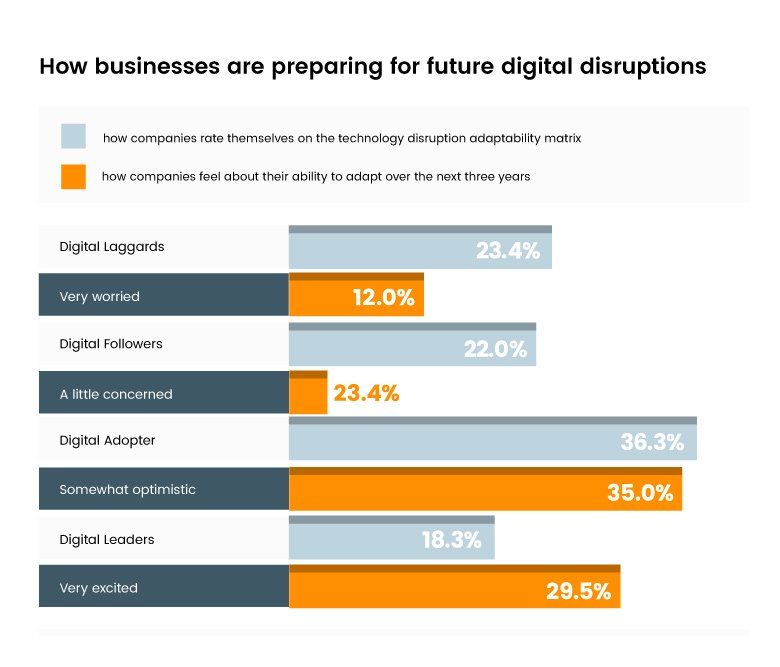- 36.9% of companies view technology disruption as an opportunity to improve and grow as a business
- In order to stay ahead of the competition, 50.4% of businesses reported having a proactive ‘opportunity-minded’ approach to new and emerging technologies.
- Only 12% of businesses voiced their concerns of their ability to adapt to digital advancements over the next three years, despite 23.4% rating themselves as Digital Laggards.
Technology is often thought about in terms of physical devices that are electrical or digital. When in fact, technology encompasses far more than simply tangible objects. New and emerging technologies often impact the value of existing models and services, resulting in digital disruption, which leads to many companies re-evaluating and transforming. Technology disruption is defined as ‘technology that displaces an established technology and shakes up the industry or creates a completely new industry’. There is currently a high-stakes global game of digital disruption, fuelled by the latest wave of technological advances spurred by A.I and data analytics. As a result, business models within industry sectors are inevitably changing. Despite the fact 19.3% of companies feel that the pace of technological change has made them significantly more competitive in the past three years, a large majority of companies are still struggling to keep up with this change.
Technology disruption is defined as ‘technology that displaces an established technology and shakes up the industry or creates a completely new industry’.
As a result, SavoyStewart sought to identify whether businesses view technology disruption as an opportunity or threat, though an analysis of the latest research conducted by Futurum*. Interestingly, it was discovered that 1 in 4 businesses still struggle to keep up with the times and thrive from digital disruption. Despite this, whilst weighing up the opportunity vs. threat of technological disruption, 39.6% of businesses feel that it provides them with new opportunities to improve and grow as a company. Savoy Stewart determined this was down to the companies approach to technology adaption, with 24.4% surprisingly, admitting to having no approach. Positively, 50.4% of businesses reported to have a proactive ‘opportunity-minded’ approach, ensuring they remain competitive and up to date.
 24.4% of the companies admit to having no approach at all
24.4% of the companies admit to having no approach at all
With 25.1% of business seemingly adopting a passive ‘wait and see’ approach, it is unsurprising that 30.7% of companies felt the impact of technological change over the past three years has made them less competitive. The window of opportunity to gain competitive advantage generally falls inside a window of three years. It is, therefore, critical for business leaders to understand the value of technologically proactive leadership and operational agility. The faster a company can use technology disruption to their advantage, the more likely it is to surge ahead of its competitors.
 How businesses are preparing for future digital disruptions
How businesses are preparing for future digital disruptions
Surprisingly, whilst 29.5% of companies stated they feel very excited about their ability to adapt over the next three years, only 18.3% rated themselves as ‘Digital Leaders’. These individuals are highly proactive and agile business leaders who are ahead in their strategic and operational anticipation of the technological change facing them and their organisation. Thereafter, 35% of businesses feel somewhat optimistic about their ability to adapt. Which is not far off the 36.3% of companies that rated themselves to be ‘Digital Adopters’; easily adaptable and proactive in their approach to evolve with technology disruption. Following suit, 23.4% are a little concerned about their ability to adapt over the next three years, indicating their company is adaptable but passive in their approach. Which is once again close in correlation to the amount of businesses that rated themselves to be ‘Digital Followers’ at 22%. Lastly, 12% of businesses stated they are very worried about their ability to adapt to technological change. Which is interesting considering almost double (23.4%), rated themselves to be ‘Digital Laggards’.